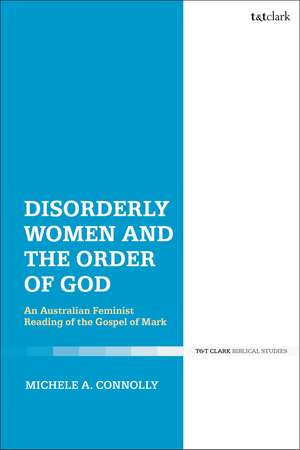Disorderly Women and the Order of God: An Australian Feminist Reading of the Gospel of Mark
Autor Dr Michele A. Connollyen Limba Engleză Hardback – 18 apr 2018
| Toate formatele și edițiile | Preț | Express |
|---|---|---|
| Paperback (1) | 230.15 lei 6-8 săpt. | +83.87 lei 6-10 zile |
| Bloomsbury Publishing – 30 oct 2019 | 230.15 lei 6-8 săpt. | +83.87 lei 6-10 zile |
| Hardback (1) | 714.68 lei 6-8 săpt. | |
| Bloomsbury Publishing – 18 apr 2018 | 714.68 lei 6-8 săpt. |
Preț: 714.68 lei
Preț vechi: 1027.76 lei
-30% Nou
Puncte Express: 1072
Preț estimativ în valută:
136.77€ • 148.51$ • 114.89£
136.77€ • 148.51$ • 114.89£
Carte tipărită la comandă
Livrare economică 23 aprilie-07 mai
Preluare comenzi: 021 569.72.76
Specificații
ISBN-13: 9780567674111
ISBN-10: 0567674118
Pagini: 224
Dimensiuni: 156 x 234 mm
Greutate: 0.49 kg
Editura: Bloomsbury Publishing
Colecția T&T Clark
Locul publicării:London, United Kingdom
ISBN-10: 0567674118
Pagini: 224
Dimensiuni: 156 x 234 mm
Greutate: 0.49 kg
Editura: Bloomsbury Publishing
Colecția T&T Clark
Locul publicării:London, United Kingdom
Caracteristici
While revering the Gospel of Mark's inclusive intention, exposes deep-grained sexism in its literary construction of female characters
Notă biografică
Michele A. Connolly currently teaches at Catholic Institute of Sydney, Australia.
Cuprins
AcknowledgmentsIntroduction1. The Postcolonial Religious World in Australia 2. Colonial Australia as the Imperialised Reading Context 3. The Myth of Colonial Australia in an Imperial War 4. The Gospel of Mark, a Christian Narrative of the First Century C.E. 5. Jesus and Women in Mark 1-126. Jesus in the Midst of Women, Mark 14-16 7. ConclusionAppendicesIndexes
Recenzii
In this original and illuminating study, Michelle Connolly uses the imperial-colonial dynamics of her Australian cultural context, as interpreted through two founding national narratives, to ground her exploration of the complex imperial-colonial dynamics animating the Christian Gospel of Mark. What results is an impressive reflection on the deep moral ambiguity in both sets of writings, which valorize male hero myths at the cost of female denigration. This superb study is a must read for anyone concerned with imperial-colonial dynamics, biblical interpretation, or the ways that texts both secular and religious encourage cultures to perpetuate gender inequality.
Michele Connolly's challenge to her readers is to become as self-aware as possible when reading an ancient and familiar text-one hedged with religious value as well. Whether her readers are only partially or quite thoroughly familiar with the Anzac myth, her treatment of it offers vivid access to the impact of our unconscious reading filters and makes likely a better reading of the gospel. I know of no postcolonial study that offers a clearer lens for examining the ancient biblical text.
The unique contribution that Michele Connolly makes in this book is the framework against which she reads women in the Gospel of Mark - namely that of colonial Australia, an imperialized reading context. She brings a contemporary feminist postcolonial perspective to the Markan text and its context, enabling her to recognize that Markan women are portrayed as 'isolated, mute' and with little impact on society; but a counter-narrative is possible. This book invites readers, whatever their location, to engage a new lens for reading the Markan text and encountering its female characters.
Michele Connolly's challenge to her readers is to become as self-aware as possible when reading an ancient and familiar text-one hedged with religious value as well. Whether her readers are only partially or quite thoroughly familiar with the Anzac myth, her treatment of it offers vivid access to the impact of our unconscious reading filters and makes likely a better reading of the gospel. I know of no postcolonial study that offers a clearer lens for examining the ancient biblical text.
The unique contribution that Michele Connolly makes in this book is the framework against which she reads women in the Gospel of Mark - namely that of colonial Australia, an imperialized reading context. She brings a contemporary feminist postcolonial perspective to the Markan text and its context, enabling her to recognize that Markan women are portrayed as 'isolated, mute' and with little impact on society; but a counter-narrative is possible. This book invites readers, whatever their location, to engage a new lens for reading the Markan text and encountering its female characters.
